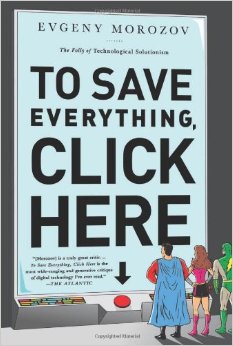 Recasting all complex social situations either as neat problems with definite, computable solutions or as transparent and self-evident processes that can be easily optimized–if only the right algorithms are in place!–this quest is likely to have unexpected consequences that could eventually cause more damage than the problems they seek to address. I call the ideology that legitimizes and sanctions such aspirations “solutionism.” I borrow this unabashedly pejorative term from the world of architecture and urban planning, where it has come to refer to an unhealthy preoccupation with sexy, monumental, and narrow-minded solutions–the kind of stuff that wows audiences at TED Conferences–to problems that are extremely complex, fluid, and contentious. These are the kinds of problems that, on careful examination, do not have to be defined in the singular and all-encompassing ways that “solutionists” have defined them; what’s contentious, then, is not their proposed solution but their very definition of the problem itself. Design theorist Michael Dobbins has it right: solutionism presumes rather than investigates the problems that it is trying to solve, reaching “for the answer before the questions have been fully asked.” How problems are composed matters every bit as much as how problems are resolved.
Recasting all complex social situations either as neat problems with definite, computable solutions or as transparent and self-evident processes that can be easily optimized–if only the right algorithms are in place!–this quest is likely to have unexpected consequences that could eventually cause more damage than the problems they seek to address. I call the ideology that legitimizes and sanctions such aspirations “solutionism.” I borrow this unabashedly pejorative term from the world of architecture and urban planning, where it has come to refer to an unhealthy preoccupation with sexy, monumental, and narrow-minded solutions–the kind of stuff that wows audiences at TED Conferences–to problems that are extremely complex, fluid, and contentious. These are the kinds of problems that, on careful examination, do not have to be defined in the singular and all-encompassing ways that “solutionists” have defined them; what’s contentious, then, is not their proposed solution but their very definition of the problem itself. Design theorist Michael Dobbins has it right: solutionism presumes rather than investigates the problems that it is trying to solve, reaching “for the answer before the questions have been fully asked.” How problems are composed matters every bit as much as how problems are resolved.
[…].
It’s also not a coincidence that my critique of solutionism bears some resemblance to several critiques of the numerous earlier efforts to put humanity into too tight a straitjacket.
Evgeny Morozov, “To Save Everything, Click Here: The Folly of Technological Solutionism”
Look at something like cooking. Now, you would hear a lot about smart kitchens and augmented kitchens. And what do those smart kitchens actually do? They police what’s happening inside the kitchen. They have cameras that distinguish ingredients one from each other and that tell you that shouldn’t mix this ingredient with another ingredient.
And for some, you might say this is great because it prevents errors from happening. But other people would say, well, this is how cultural innovation happens. We need to leave certain margins of error in place and actually allow people to mix ingredients in ways that are silly and unexpectable for new cultural innovation, new culinary products to emerge. I mean, something like sushi or lasagna were not built by a committee armed with big data. It’s not something that obviously occurs to you, right? It’s something that you need to experiment with.
And if we make a lot of these rituals too rigid and if we rely especially on previous methods, and that’s where all the hype about big data comes in, we might end up in a very culturally conservative universe that, I think, will not be very pleasant to live in.
[…].
But you have to understand how it’s being marketed to us now. It’s not being marketed as a vice fee. It’s being marketed as a health premium. So those of us who are healthy can start monitoring ourselves and then start disclosing that information to insurance companies and we will get a premium. But notice what happens: Once enough of us monitor ourselves in order to get lower prices and better premiums, those of us who refuse to monitor because we find it intrusive no longer have that option because institutions around us start assuming that if we don’t share, we have something to hide.
We have a disease. We have some health condition and that is the reason why we are not self-tracking, so they charge us a vice fee or they charge us a higher premium. Right? So in a sense, when Silicon Valley tells us that we all have a choice; you don’t have to use it if you don’t want to. Well, at some point, we are forced to do it because if we don’t, certain assumptions are made about us and certain discriminatory practices emerge…
I think governments will increasingly be tempted to rely on Silicon Valley to solve problems like obesity or climate change because Silicon Valley runs the information infrastructure through which we consume information.
And I think our policymakers need to be aware that – of the costs that come with solutions, once those solutions are taken on by Silicon Valley. They will not come from for free and the efficiency that we’ll get from Silicon Valley, we’ll have to pay for it with privacy or politics or just being able – being unable to live in a world that still tolerates inconsistency.
Op-Ed: There’s An App For Everything, And That’s A Problem
